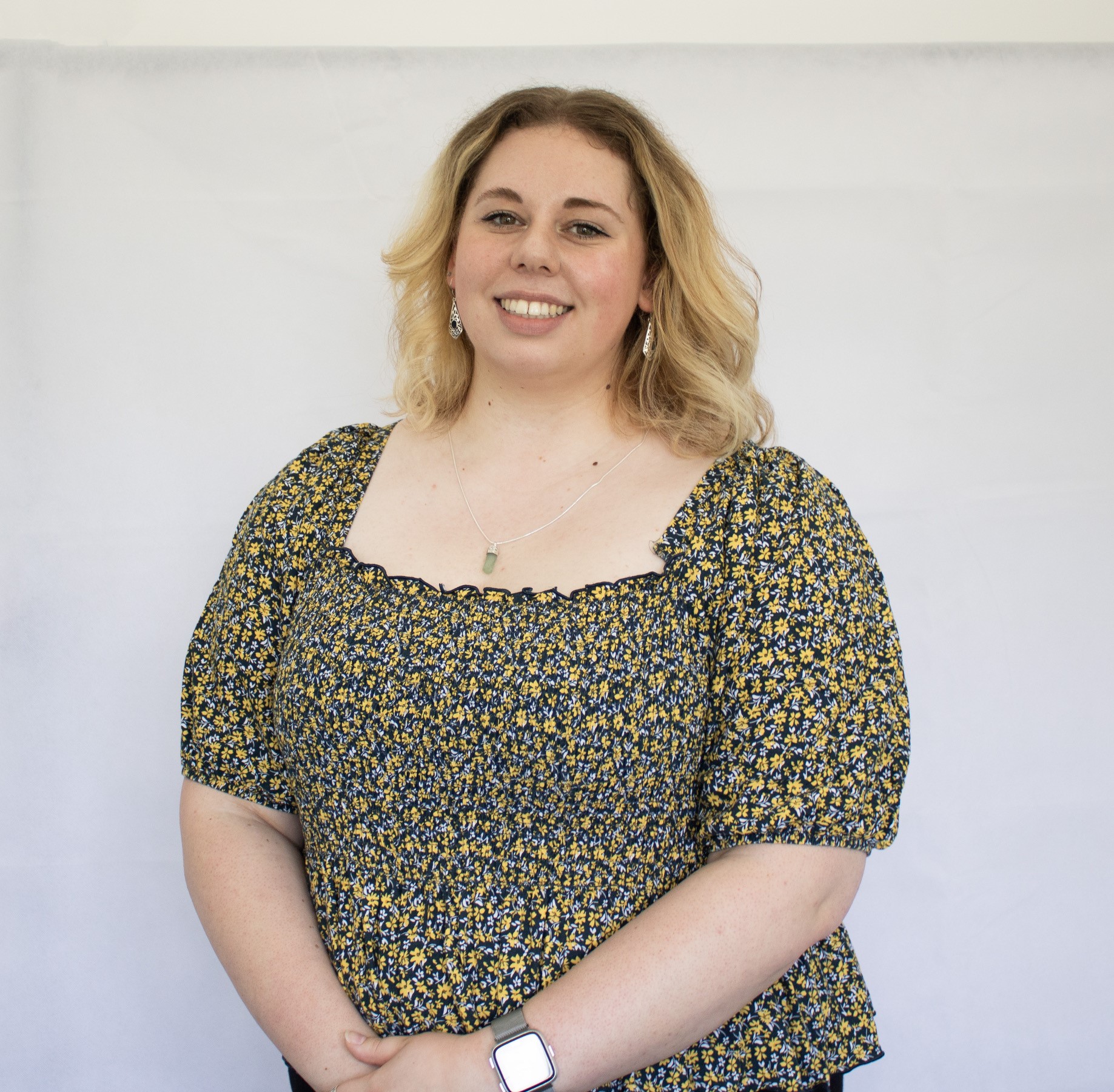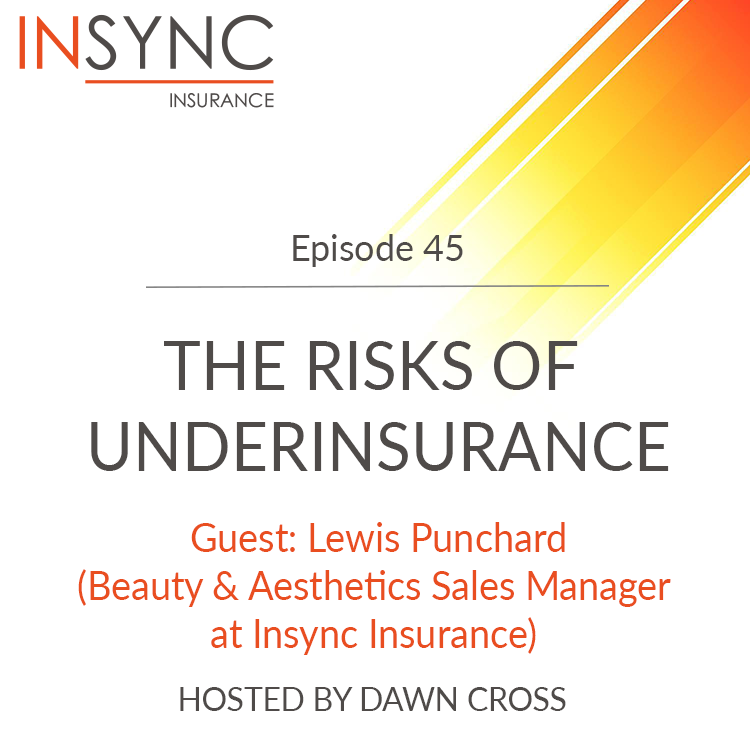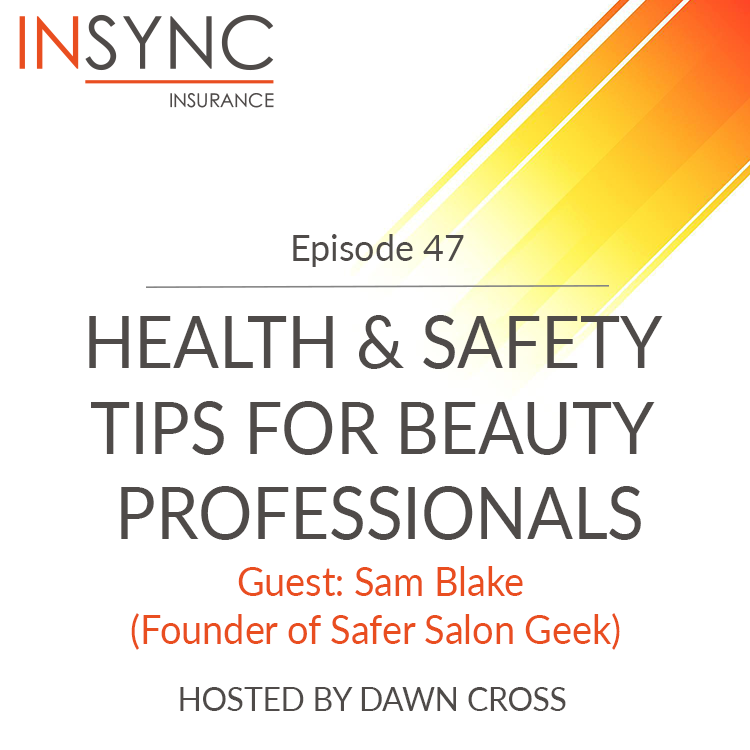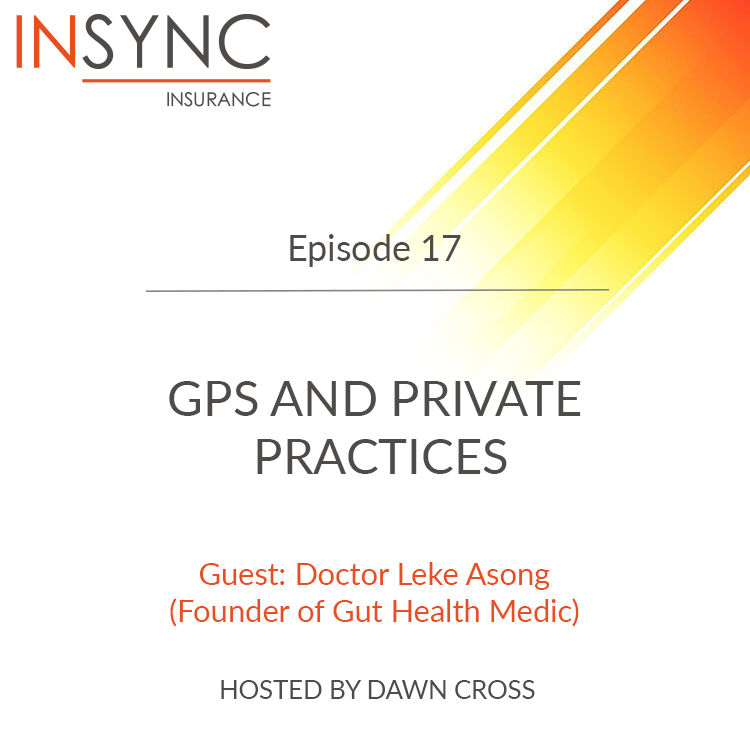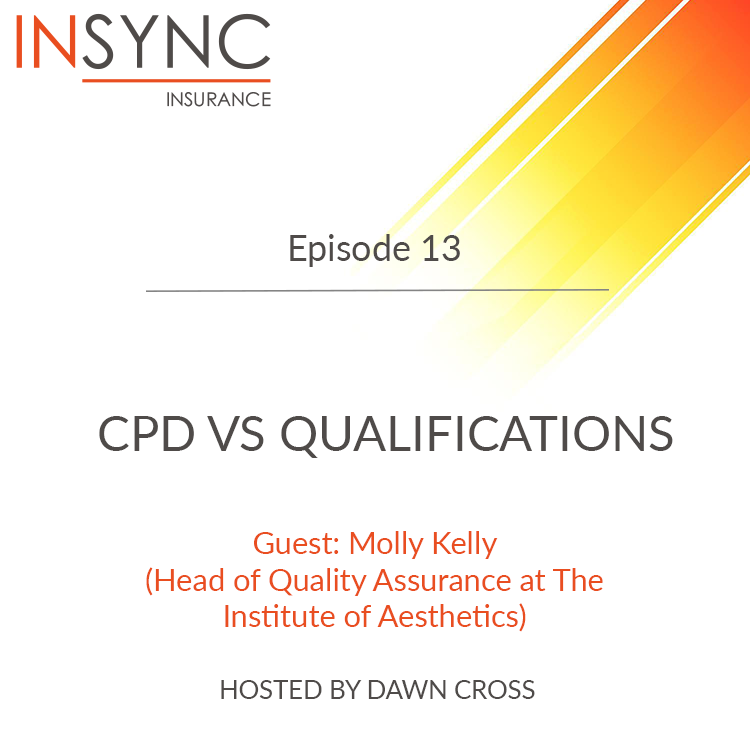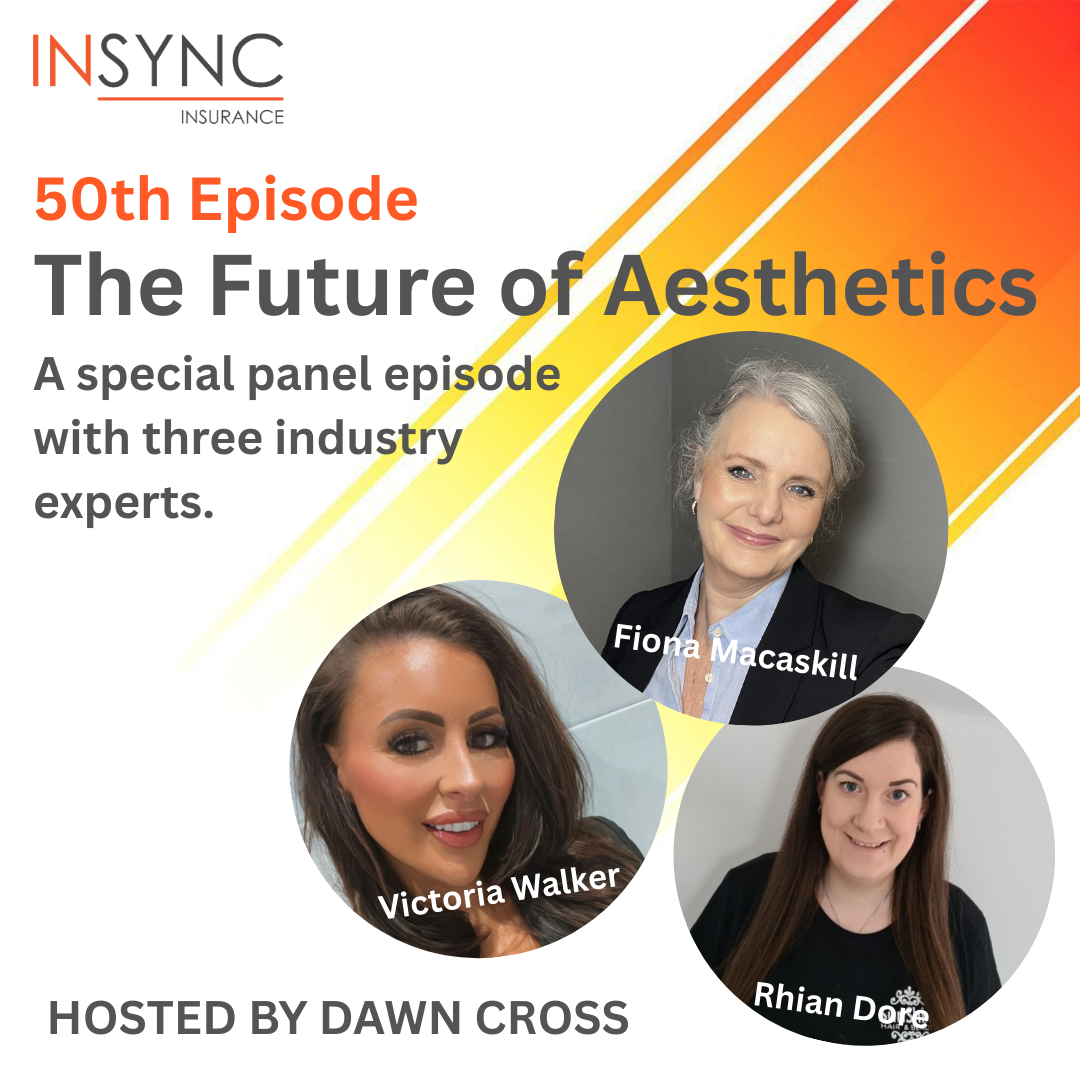[00:00:03] Speaker A: Welcome to the Insync Assurance Podcast. I'm your host, Dawn Cross, and today I'll be delving into aesthetics insurance policies. Back with our very own sales manager, Lewis Ponchard.
If you enjoy our podcast, make sure to leave a rating on your favorite podcast directory.
[00:00:20] Speaker B: So, welcome back to the podcast. It's been really great to have you on, especially after our underinsurance episode.
[00:00:28] Speaker C: Hi, how you doing?
[00:00:30] Speaker B: Yeah, not too bad. Lovely to see a lovely face again. So we were talking and chatting and looking at everything. We thought, you know, let's do an episode talking about aesthetics insurance and actually how it breaks down into it. Because obviously it's very big, it's very, can be very daunting for those who have not taken it out before or even still like five years in the industry. So we thought this would be a really great idea to do so I guess. Well, the main first question is, you know, what is aesthetics insurance and what are the prerequisites for it? So how does one qualify for it?
[00:01:03] Speaker C: Okay, so when we look at aesthetics insurance as a whole, you generally have two types of clients. So you've got medics and non medics.
Both have obviously own criteria.
I would say we'll go medics first because that's generally the easier one to explain. So for us to be able to insure a medic, all we require is that that medic is licensed with a governing body, whether that's nmc, gdc, hmpc, whoever that may be. As long as they are licensed and have an active pin, that's generally all we require for a medic to be able to gain insurance.
There is a bit of flexibility. So what I mean by that is if they were a medic for say 10 years and their PIN is recently expired, there is cases where we can send that into the insurers and they will still accept it as a medic. But that's not every case. You know, we do need those clients to explain the situation and we do need a bit more information.
But that is still potential option that we can refer those cases into the insurer and they will potentially still accept them under medic rates.
Non medics is a little bit more in depth.
So we have a few different ways that we can insure a non medic.
The first way is what known in the industry as an approved fast track course.
So fast track courses, just to give you a bit of background, are something that we actually designed as a broker.
And the reason why we designed these is we kept finding a lot of beauticians that had been in the industry for many, many, many years, held lots of wonderful qualifications and had done lots and lots of treatments for many years. But they didn't necessarily meet the normal prereqs for aesthetics insurance and there was no way for us to insure them for Botox and fillers.
So what we basically did was we approached at the time, one of our insurers and said, look, we need to find a way of insuring these and that's where fast tracks come about.
So yeah, we now use a number of different academies for fast tracks.
Fast tracks need to be approved by us before a training academy can start doing them and offering them. So not every academy has approved fast tracks. With us there is only certain academies.
But yeah, as long as a student completes a recognized fast track with one of our training providers, then we can ensure that person, once they've completed the fast track with no other prereqs. So that's one of the routes that you can go down as an approved fast track course for a non medicine. The second route is beauty qualifications.
So if you hold an MVQ Level 3 in general beauty or equivalent to an MVQ Level 3, we can also ensure you.
It's important to note that with that it needs to be the full general Beauty MVQ Level 3 because there is sort of side passes to that. So you can do like an mbq level 3 and massage or an mbq level 3 in I think it's electrical facials which just trains part of the MVQ free, not the full mvq.
So we do require it to be the, the full MVQ level free in general beauty. But yeah, if you have that, then you can also gain insurance with most of our insurers for a non medicine and the main one, the last one is needling experience.
So most insurers look for a minimum of six months post qualification needling experience to go hand in hand with anatomy and physiology level three. Now when I say six months post qualification, so that's you do a microneedling course, you pass that course today, you get certified today, you then need to go and do six months worth of microneedling treatments from today on. Clients doesn't necessarily need to be paying clients, so you can do things like friends and family and that sort of stuff, but you just need to be able to evidence that qualification. So consent forms, etc.
The reason why is because that is one of the first things that the insurers will ask for in the event of a claim is proof of your needling experience.
And if you cannot prove that you've got that six months needling experience that could put the potential claim at risk.
There is a few other ways and avenues into non medics insurance, but that generally is your sort of three main ways in.
You know, for example, if you don't have anatomy and physiology level three, but you've got 12 months needling experience, we can, we can still, we can still ensure you.
Or if you've got like an MVQ2 and X amount, I think it's 3 months need an experience with an MVQ2 in general beauty, we can sometimes still ensure you. So there is other avenues into it, but that is generally your main three. You've got the fast track to aesthetics, you've got MBQ level three or equivalent to an MBQ level three in general beauty and then six months needling with anatomy and physiology level three.
[00:06:49] Speaker B: And obviously it's a case by case basis, isn't it? Like whoever kind of comes to it, you may not necessarily fit into the cookie cutter hold, so to speak, but you know, it's like the least you can do is at least phone or something, obviously like explain your situation because you never know that the insurers might be like, well, yeah, that's absolutely fine. And not everyone has had a traditional route, so to speak, coming into.
[00:07:14] Speaker C: Yeah, this is why, this is why I say there is potentially other avenues that can be explored. You know, just because you don't meet one of those three doesn't mean that you will not get insured.
It just means that we will have to take probably more information from you around your qualifications, your experience, your training, etc. And refer it off to the underwriters.
One thing that we find is a lot of people don't actually realize they have the experience, so they might not understand fully what classifies as needling. You know, I've spoken to people personally myself in the past and I've said, look, have you got six months experience in, in needling? And they've gone, no.
And then they're calling back 30 minutes later saying, actually I completely forgot, I've been doing microneedling for the last three years. When you asked me about needling, I thought you meant have I been doing Botox or fillers for the last six months. And so, you know, people get confused. So absolutely fine, just pick up the phone, have a conversation with us and we'll ask the right questions to be able to ascertain whether we can, whether we can insure you or not.
You know, I also appreciate as well that this is our criteria as a broker. Other insurers and other brokers may have different criteria. So just because we've said, look, unfortunately based on what you've told us, we can't cover you, doesn't necessarily mean that you won't get covered. There might be other insurers that have arrangements with the academies or with insurers where they can potentially insure you. So as much as we, you know, love to insure everyone, sometimes we can't.
So, yeah, pick up the phone, ask the questions and we'll be more than happy to help.
[00:08:58] Speaker B: Absolutely brilliant. So I guess the second question is, you know, someone kind of calls up and, you know, they can't necessarily just get it through our website, but you know, how does it all go about? So we don't need it, we don't have to go for a play by play. Obviously, you know, when people call up, they can find out anyway. But like, just to ease anyone who's a bit unsure, how does it work when you do pick up phone and calling vocalizers?
[00:09:22] Speaker C: Okay, so yeah, obviously we try and make the process as simple and as pain free as possible.
You know, I appreciate, and we appreciate as a business that the last thing people want to be doing during their day is sitting on the phone for 20 minutes speaking about insurance. It is quite a boring and tedious thing to do. So we do try and make it as painless as possible.
But obviously people need to appreciate that we as a business are heavily regulated by the fca. So we have a process that we have to go through to enable us to provide you with a quote that involves us taking a full profile from you in terms of your business, what you do, your qualifications, your certificates, making sure they're accredited, you know, all these sorts of basics. We need to ascertain about things like turnover, where you do your treatments, your claims history, your personal circumstances, you know, basics, ever been bankrupt, CCJs, criminal convictions, you know, all the basic profile questions that you get. Generally for any insurance that you apply for, you know, when you ring up for car insurance and house insurance, they need to know about convictions and stuff. It's no different.
We then have, depending on the insurer, a set of insurer questions. So each insurer has what's known as a statement of fact, which is a set of questions that they need answers to to be able to rate the risk. And that's generally around again, quite similar things. So qualifications and your history in the industry, as well as things like hygiene, cleanliness, you know, all the basics of Running a beauty business.
Once that generally is done, obviously we will go through the COVID and we will explain to you how the policy works, how the limits of indemnity work, things like excesses, how that all works. We will offer other benefits outside of your standard package that maybe have interest to you. So for example, some insurers will do things like contents, tenants, improvements, buildings, business interruption.
We will then also go through as well the additional products that we offer as a broker. So things like legal protection or excess protection, things that might help you in your business moving forward.
And then the last thing that we normally do before giving pricing is just go through what's known as endorsements.
So that is like your terms and conditions from the insurer that they that you need to follow as a practitioner for your treatments. So just to give you an example, if it's a dermal filler treatment, there will be an endorsement on the policy which will include things like making sure you dispose of your sharps in sharps bins.
It will have in there around maybe dermal filler products that the insurer doesn't insure you to use. And these, these are things that you have to abide by with this insurer. If you don't, it could invalidate your policy. So the endorsements are a very important bit. So we always go through these with you over the phone before you purchase the policy. And we will also include them in your policy documents so you've got a hard copy of these to refer back to at any time during the term of the insurance.
And then, yeah, once the endorsements are done, it's a case of giving you the price.
Obviously you're not obligated to buy the quote. So if you've had cheaper prices elsewhere, obviously we will hold conversations with you around those cheaper prices, making sure that that cheaper price gives you the COVID that you and your business need. But you know, we're not always the most competitive. In every case, you know, we like to think that we are very competitive competitive and we hold our own very well in the market. But there is cases where we might get beaten on price. And this is the luxury of us being advised. You know, I've held many of conversations with people in the past where we've just been beaten. You know, the covers the same in terms of limits, the terms and conditions are the same and the client is happy with the terms and conditions. We are just 20 pounds a year more expensive. And you know, if that's the case, then great, you know, go with the other insurer and we'll try again next year, you know, so it's not all about cost with us, you know, we will always make sure that the level of COVID you are getting is adequate to protect your business. I would much rather pay 20 quid for a year. 20 quid more a year. Sorry For a policy that I know will work in the event of a claim rather than cut a few corners, save 20 quid and then have hell when it comes to claim.
Because yeah, 20 quid is 20 quid in my opinion.
[00:14:19] Speaker B: Yeah, I definitely agree as well because at the end of the day it's not just about okay, what can I get cheap? That's okay. So then I'm sured I'm all done, I'm sorted. It is very much you need to pay attention to the details. Are you definitely covered? Is it going to cover you in the worst, worst case scenario, which hopefully would never happen. But you've also got to prep for that kind of thing. It's something you can't just ignore.
[00:14:41] Speaker C: Yeah, agreed. This is the reason why you have insurance, right?
[00:14:45] Speaker B: Definitely.
So obviously you kind of talked us through each little part. What kind, which sections should people pay the most attention to?
[00:14:56] Speaker C: So obviously one of the main ones is making sure that during the process you're as truthful and as honest as you can be throughout the whole process. Because as an insurance broker slash insurance company, we put a lot of trust in you when we're going through the process. You know, for example, things like your certificates, we won't take copies of them up front, we don't need you to send in 100, 100 certs because we speak to hundreds of people daily and if everyone sent us 100 serps, we, we'd have no file space left. So you know, we trust what you say to us when it comes down to like your qualifications, your courses being accredited, your things like your turnover, your sums, insured amounts and things like that. So you know, be as truthful and as honest as you can when going through the post the process obviously important areas to pay attention to is obviously things like endorsements, the terms and conditions of the policy that you need to abide by because if you don't your policy could end up being invalidated which means that claims won't be paid.
Statement of fact questions. So when an agent or an advisor is going through the statement of fact questions again, make sure you answer them truthfully because if you don't, that's only going to invalidate, validate your policy again in the event of a claim you know, so if we ask you, are you working in a clean and sterile environment, but actually you're working out of your lounge where your dog sat, don't say yes, because that's technically not a clean and sterile environment.
So, you know, little things like that, just make sure you answer everything as truthfully and as honestly as you can.
One of the big ones as well is obviously, you know, referring back to our Underins Insurance podcast that we did is Limits of Indemnity. So, generally, a policy is split into two indemnity limits. You've got your professional indemnity, slash medical malpractice, and then your public liability indemnity limit. So no one knows what a claim is going to cost.
We don't, you don't, and the insurers don't.
But like you said earlier, dawn, go worst case scenario. Think of the worst when it comes to your indemnity limits.
And always pick an indemnity limit that you are comfortable with. You know, so if you're doing advanced esthetics, that is, things like Botox, fillers, breads, skin boosters, you know, injecting people and putting things into people's bodies, opting for an indemnity cover limit of 100,000 or 250,000, in my opinion, is not enough.
If you're insuring a salon and someone's offering you 250,000 for public liability for slips, trips, falls and bodily injury, in my opinion, again, that is not enough. So, you know, make sure you're adequately insuring yourself. You know, I think I mentioned on the Underinsurance podcast, our insurers that insure aesthetics will not insure you for less than a million pounds. That is our minimum limit. And we can go up to 10 million.
You know, very rarely do we go that high, but we have done in the past. But we've done multiple policies on a million, two million and five million. So, you know, don't be afraid to pay that extra 50, 60, 100 pounds a year to go from 1 million up to 2 million for that peace of mind. Because peace of mind is probably very important to most people. This is why you have insurance. You know, you have insurance for peace of mind that if you ever need it, you are going to be 100% covered for what you need it to cover you for.
So, yeah, that's probably the most important, important parts to pay attention to when going through the process. And if you're going through the process and there's anything that you're unsure about, stop and ask questions. Don't just sit there not knowing the answer because it's your business and it's your insurance. If you don't fully understand it, that's not a good place to be and when you need it. So if you're going through the process and you don't understand a term that's been used or that could be something as simple as an excess, you know, I've spoken to many people, not just in this job, in previous jobs, that don't know what an excess means. You know, if you don't know, ask and we'll explain what that means. If you don't know what endorsements mean or, you know, if anything you don't understand, ask the question and get the, get the guys to explain it because they'll be more than happy to go for it in a lot simpler terms.
[00:19:51] Speaker B: And I think a lot of people I know obviously saying you've got that kind of high limit and stuff like that 1 million makes actually quite a lot of sense because if you think about if someone trips or falls in your salon, for example, not only are they going to, you know, sue you or whatever, there's so many costs, including the legal cost. You need the legal cost of your side. It's obviously the defendant wins, then you have to pay probably their legal costs as well. Emotional distress as well as, like time of work, obviously the wages that they've lost whilst being unwell due to something that happened which, you know, you didn't necessarily purposely make it unsafe for them, but it happens. And that those costs rack up so quickly. And that's why, you know, 100k or 250k is not actually going to cut it in the long run because of the amount of things that would be involved if that ever was to happen.
[00:20:42] Speaker C: Yeah, agreed. I was having a conversation with a potential client on one of the social media pages the other day, which we then moved into sort of private messenger and we were having a conversation around indemnity limits, funnily enough, because they were with a policy that was, I think, 250,000.
And, you know, their argument, which to a degree was semi valid, their argument was, but, you know, I've been doing these treatments for 15 years and I've never had any problems.
And my response was, but this is not just a treatment policy.
You know, this doesn't just protect your treatments and you may be the best semi permanent makeup artist in the world, but an accident can happen.
But you've also got to think as well, these policies cover public liability and public liability claims. Someone Tripping over or slipping up on a wet floor has got nothing to do with your skill level. You know, you could be the best semi permanent makeup artist in the world, but you cannot stop someone falling down the stairs.
And if that happens, and like you said, there's so much that's involved in a claim, it's that 250k limit is not a compensation limit for the accident. That 250 covers everything from, like you said, court fees and solicitor fees all the way through to compensation.
If the person takes time off work covering their loss of earnings, they could be a primary carer for someone else, which they can't care for them whilst they're injured, so you've then got, they've had to pay someone else to care for them. You'll end up having to cover those. Like there's hundreds of costs, hidden costs that could be occurred. And like you say, nine times out of ten, if you lose your case in court, you normally get lumbered with the, the other person's costs, court costs as well.
And I think what people, a lot of people don't quite understand is once the limit of indemnity is reached, anything over that, you as an individual or you as a business are liable for.
And that's the scary part for me, you know, if the claim is 500,000 or 600,000, which we've seen these sorts of claims happen, and you've only got a 250k limit, your claims, 500,000, you are then liable for 250 grand.
Like, I don't know personally, anyone that's got that money lying around.
And I would not personally want to be in a position where I'm trying to find 250,000 and potentially losing my car, my house, my assets, because I've underinsured myself.
And that is a potential risk with these types of policies. And that's not me saying that you will never be in that position if you select a million, because claims can go over that, you know, so this is why we say we don't do anything more, less than a million, but we do more. So, you know, if you don't think a million is enough, then you might be right.
You know, if someone falls down the stairs and they break their spine and they physically cannot work ever again, you could be then liable to cover their salary for the next 25, 30 years, plus all the court fees, the compensate.
[00:24:18] Speaker B: Like, it could go on and on.
[00:24:20] Speaker C: It could go on and on. You know, if the claim goes over a million, yes, you could potentially be in that position with one of our policies. So if you don't think a million is enough, that's why we have the 2 million option, we have the 5 million, we have the 10 million. Because, you know, how long is a piece of shrink? What is a claim going to cost? You're not going to know until you're in that situation.
It could be something minor, you know, customers not happy with the way their lips look or they got a minor infection that cleared up with antibiotics. And that claim might be 10 grand. If it is, then yeah, your 250 policy is fine, but not all claims will be 10 grand and not all claims will be 800 grand. But this is why you pay for the insurance. It's to have that peace of mind that when you need it, you are going to be covered as much as for the limits of indemnity that you select. And you know, we won't advise you, we will never say, you know, you have to have a million. We will give you the options. We will say, look, we offer 1mil, 2mil, 5mil, 10mil.
What limit of indemnity would you like?
[00:25:28] Speaker B: No, definitely, and is just so key to bear that in mind. I actually have a question that kind of pops up a lot from people actually is, you know, can you add treatments as you go to your cover? So, for example, you know, they've got a basic cover, but they've recently kind of qualified in a new type of microneedling or something similar. And obviously then they would probably want to be insured for that treatment as well. You know, is this something that we do?
[00:25:59] Speaker C: Short answer is yes, you can make changes to your policy at any time throughout the 12 months, depending on the type of change. So for argument's sake, let's just say you're a microneedling semi permanent makeup artist with a beauty beauty insurer and you then qualify in injectables.
You probably won't be able to add that to your current policy because beauty insurers probably won't insure injectables, but some do. So you may be able to do a midterm adjustment and add them on. Majority of the time you will need to be moved from a beauty policy to an injectable policy. So that's what we call a rebroke and we would take care of that process for you. So we would run you through the journey and then we would change your policies over.
Let's just say it's a case of you are on an aesthetics policy, you're already insured for botox and fillers and you just want to add another treatment on, say B12 or skin boosters, then yes, you can add that on at any time.
Some insurers may charge you to do this. Every insurer is different.
But yes, treatments can be added and cover can change at any time.
The only time you may struggle is if you have an ongoing claim or you have been notified of a claim. So for example, if you have a million pounds worth of COVID a client calls you and says, you done my lips last week and I lost all feeling in my face and I've got major infection. You can't then ring the insurer and go, just been notified of this. Can I increase my cover from 1mil to 2 million? Because you are expecting a potential claim, so you can't do that. But yeah, as long as it's just a case of changing cover, adding treatments, increasing limits, lowering limits or whatever it may be, then yes, you can generally do that at any point. But there may be obviously additional charges, increases or decreases to the policy to that effect.
[00:28:05] Speaker B: Brilliant. Is there anything else you'd like to add before we wrap up this episode about.
[00:28:11] Speaker C: No, not that I can think of. Obviously, I'll mention it again if anyone's got any topics that they would like to discuss or if anyone wants to be involved. You know, if there's any beauticians out there or training academies out there that want to come in and ask questions and do a bit of a Q and A session, I'm again more than happy to sit here and answer any questions and have those conversations. But yeah, we will continue to do these. We'll. We'll delve deeper and we'll continue to delve deeper into the aesthetics and beauty insurance world.
I think one of the podcasts that we said that we would look at doing, dawn is going into a bit more details around the Indemnities himself. So explaining the differences between Med Mao, Professional Indemnity, public liability. So I think that'll be a good one.
But yeah, if there's anything in particular that you would like us to discuss or any questions that you would like me to answer, then yeah, just let me know.
[00:29:12] Speaker B: And obviously if anyone has any questions, whether about possible insurance or their current policy is obviously give us a ring. Because at the end of the day, you know, your policy is unique to you as well and obviously the advisors will be able to look at your account and help you as best they can. Or well end up maybe referring them on to you and they get to speak to your lovely self.
[00:29:34] Speaker C: Exactly that. Exactly that. There's plenty of ways to contact us, obviously. Phone, email, social media, whatever works best for you. Just reach out if you've got any questions or if you were looking for a quote.
And yeah, hopefully we can help, you know, and if we can't, at least you know that the policy you've got is a good policy.
And, yeah, reach out.
[00:30:01] Speaker B: Well, thank you.
Thank you so much for coming on today to discuss this.
[00:30:06] Speaker C: No, my pleasure. I'll speak to you soon.
[00:30:09] Speaker A: Thank you to my guest today, Lewis, for chatting about the ins and outs of aesthetics, insurance and how it all works. If you have a question about your insurance, email us at hello, NSync Insurance, or check out our
[email protected] I have been your host, Dawn Cross and tune in next week for another episode.
Insync is one of the UK's fastest growing insurance providers, offering comprehensive cover for SMEs and self employed across the UK. Our expert team can tailor your insurance to meet your individual business needs and compare prices from our Lloyds of London approved partners. We offer a 5 star service and have been FIFA Platinum trusted winners 5 years in a row.

